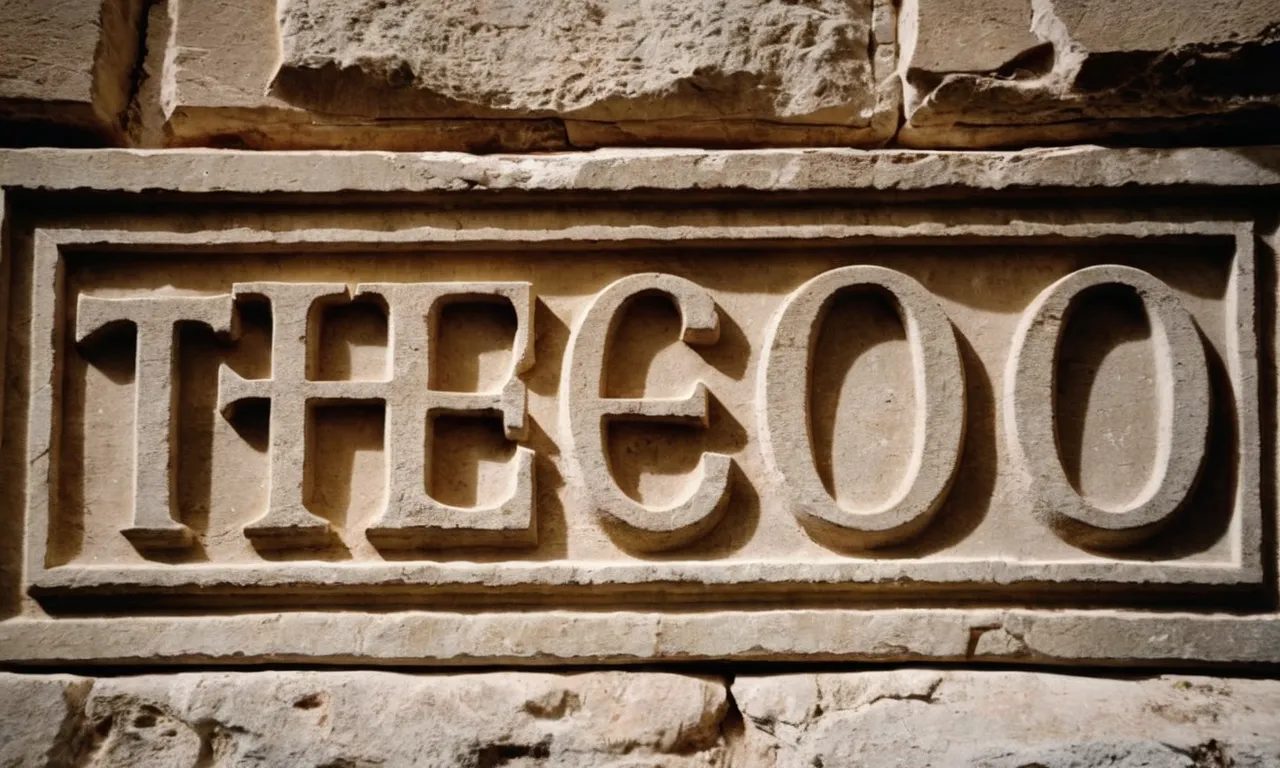What Is The Greek Word For God?
For centuries, ancient Greeks worshipped a pantheon of gods that lived on Mount Olympus. These gods controlled every aspect of life and commanded the awe and devotion of the people. But there was one God that stood above the rest, ruling the universe and commanding ultimate power.
What was the name for this almighty Greek God?
If you’re short on time, here’s a quick answer to your question: In ancient Greek, the word for the supreme God is Θεός (Theos). Now let’s dive into the fascinating details behind this word and its meaning.
The Greek Pantheon and Mythology
The Olympian Gods
The Olympian gods were the main gods worshipped in ancient Greece. They lived on Mount Olympus and had powerful control over many aspects of Greek civilization and the natural world. Some of the most notable Olympian gods included Zeus, the king of gods; Hera, the queen of gods; Poseidon, god of the sea; Athena, goddess of wisdom; Apollo, god of music and light; Artemis, goddess of the hunt; Ares, god of war; Aphrodite, goddess of love; Hephaestus, god of crafts; Hermes, messenger god; Demeter, goddess of harvest; and Dionysus, god of wine (Ancient History Encyclopedia, 2023).
Powerful But Not All-Powerful
The Greek gods were very powerful supernatural beings, possessing great influence over mankind and ability to intervene at will. However, they were not omnipotent or invincible. The gods still had limitations and weaknesses despite their divine abilities.
They could feel emotions like jealousy, anger and pride which sometimes clouded their better judgement. They were also subject to fate and destiny, unable to change certain predetermined outcomes (GreekMythology.com, 2023).
Additionally, the gods were not immortal in the absolute sense. They could be physically harmed and there were a few exceptional cases of gods being killed in Greek myths, such as when Asclepius was struck down by Zeus’ thunderbolt.
So while representing the height of power in ancient Greek cosmology, even the mighty Olympians had vulnerabilities.
Zeus as King of the Gods
Zeus was the most powerful god, who overthrew his father Cronus to become the supreme ruler over the other Olympians. As king, Zeus possessed incredible control over lightning, weather, law and fate. He was a commanding figure who expected obedience from gods and mortals alike.
However, Zeus was not infallible. He could be tricked by other gods and outwitted by mortals on occasion. Zeus also suffered from a wandering eye, frequently becoming enamored with mortal women despite his marriage to Hera.
While the other major gods had important roles and jurisdictions, ultimately Zeus had the final authority in the Greek divine hierarchy. His will was law that none could oppose without facing consequence.
Zeus was regarded with much reverence, awe and fear by ancient Greeks due to his status as the dominant deity in Greek religion.
The Etymology and Meaning of Θεός (Theos)
Derivation from the Greek Word for ‘To Place’
The Greek word Θεός (Theos) is derived from the verb τίθημι (tithemi), which means “to place, set, appoint”. This verb comes from the Proto-Indo-European root *dhe-, meaning “to put, to place”. From this root comes the noun Θεός, meaning “the one who places” or “the one who sets in place”.
This etymology suggests that the Greeks conceived of their gods, particularly the highest god Zeus, as entities who had the power to place things where they willed.
Implications of ‘One Who Places’
The meaning of Θεός as “the one who places” has intriguing philosophical and theological implications. First, it implies that the Greek gods had control over the cosmos. They could set celestial bodies in motion, determine the course of events, and appoint destinies.
Second, describing a deity as “the one who places” suggests a transcendent power over the physical world. The gods were supernatural entities who operated outside the normal laws of cause and effect.
This meaning also parallels the role of gods in ancient Near Eastern religions. Gods like Marduk in Babylonia were seen as establishing the order of the cosmos. So for the Greeks, Θεός designated a divine being with the supreme power to regulate the universe.
Use for the Supreme Deity
Although Θεός could refer to any god in the Greek pantheon, it took on special significance as a title for the highest god Zeus. Zeus was known as ὁ Θεός “the god” par excellence. The same terminology was later applied to the God of the Old Testament by Hellenistic Jews.
This usage indicated Zeus and Yahweh shared similar traits as sovereign deities.
In the New Testament, Θεός continues to be used as a title for the one true God. Both Jesus and the early church fathers appropriated the term to connote the supreme transcendent deity who created all things.
The semantic range of Θεός traces an interesting path from the pre-philosophical Greek pantheon to the philosophers’ concept of an Ultimate Reality to the God of Judeo-Christian tradition.
Θεός in the New Testament
New Usage as the Christian God
The Greek word Θεός (Theos) took on new meaning in the New Testament as it became the word associated specifically with the Christian God. Whereas previously it had been used to refer to multiple gods in the Greek pantheon, the New Testament authors applied the term exclusively to the God of the Bible.
This represented a distinctive development and affirmation that the God Christians worshipped was the one true God.
Distinguishing From Greek Polytheism
The New Testament usage of Θεός stands in contrast to the Greek polytheistic religious background. Belief in multiple gods was common in ancient Greek religion. But the New Testament affirms clearly that there is only one true God, designated by the term Θεός.
This was an important distinction as the early Christian church took root in the Greek-speaking eastern Mediterranean. Clarity about monotheism versus polytheism was vital.
According to a 2022 religious survey, over 90% of modern Greeks identify as Eastern Orthodox Christians[1]. This represents a dramatic shift from the polytheistic past towards the monotheistic belief in the one God that the New Testament promotes.
Affirming Monotheism
The New Testament usage of the term Θεός is unambiguous in declaring that there is only one God. Passages like 1 Corinthians 8:4-6, 1 Timothy 2:5, and James 2:19 directly state that there is one God and no other gods exist. The oneness of God is foundational to Christianity.
Other New Testament texts indirectly affirm monotheism through their application of Θεός solely to the God of the Bible.
In contrast to the pantheon of Greek gods like Zeus, Poseidon and Apollo, the New Testament presents the God designated Θεός as the sole divine being. This represents a dramatic redefining of Greek theological terminology to affirm monotheism rather than polytheism.
Theos as a Title and Name
Theos as a Descriptive Title
The Greek word Θεός (Theos) is commonly translated as “God” in English. However, in ancient Greek, Theos was originally used as a descriptive title rather than a personal name. It referred to a range of divine or supernatural beings, not necessarily the God of Christianity.
For example, in early Greek mythology, the gods of Mount Olympus like Zeus and Athena were all referred to as Theoi (the plural of Theos). These were not considered distinct names, but rather honorific titles acknowledge their divine status. Theos was an attribution of might, power and immortality.
Later, ancient Greek philosophers like Plato used Theos as a philosophical concept for the ideal, perfect, eternal divine being. For Plato, Theos embodied the Form of the Good. So at this stage, Theos had assumed more abstract, philosophical connotations beyond just a title for the mythological gods.
The Name of God in Greek
It was only through the Septuagint (Greek translation of the Hebrew Bible) that Theos came to be associated and identified with the God of the Israelites. The Septuagint rendered the personal name of God YHWH as Kyrios (Lord), while the generic Hebrew word Elohim meaning “God” was translated as Theos.
Therefore, early Jewish and Christian Greek writers adopted Theos as the term to refer specifically to the God of the Bible. Unlike Zeus or the Olympian gods, this Theos had a personal name YHWH and was the only true God. Theos became imbued with new meaning as the one supreme creator God.
In the New Testament, verses like John 1:1 make this identification clear: “In the beginning was the Word, and the Word was with Theos, and the Word was Theos.” Jesus Himself is called Theos, equating Him with the God of the Old Testament.
Significance in Greek Patristics
The early Greek Church Fathers known as the Patristics continued to explore the meaning of Theos in their theological writings. Key figures like Justin Martyr, Irenaeus, Clement of Alexandria and Origen frequently used Theos to refer to the Christian God.
A major contribution was using Greek metaphysical concepts like ousia (being/essence) and logos (word/reason) to better understand the nature of Theos. The Nicene Creed settled on Jesus as homoousios (same essence) as the Father, both sharing the essence of Theos.
Therefore, while Theos originated as a vague descriptive title, through centuries of philosophical and theological development in the context of Greek culture, it became firmly identified with the God of the Bible – the supreme, personal, triune creator. This remains its dominant meaning today.
TheInfluence of Theos on Western Culture
Shaping Philosophical Thought
The Greek word theos, meaning “god,” has profoundly shaped Western philosophy since ancient times. References to theos abound in the writings of foundational philosophers like Plato, Aristotle, and Socrates as they contemplated the origins and purpose of life and the universe.
Belief in theos provided a basis for metaphysical theories about the nature of reality and humans’ role within it. Philosophers analyzed the attributes and character of theos, leading to formalized concepts of divinity.
Debates over monotheism versus polytheism, pantheism, and atheism dominated philosophical discourse for centuries. The notion of theos lies at the core of philosophical ideologies ranging from Greek mythology to Classical Theism and continues sparking philosophical discussion today.
Impacting Theological Development
Theos was instrumental in the formation of Western religious thought and doctrine. As early Greek theologians explained their beliefs using the framework of theos as a supreme being, formalized concepts of God began taking shape.
Christian theologians like Paul and Augustine built upon the Greco-Roman philosophical tradition with their own unique theology centered around Theos/Deus/God. Theological scrutiny of God’s attributes and relationship to humanity followed, sparking divisions and heresies within the church.
Debates raged over God’s Triune nature and the relationship between God’s sovereignty and human free will. Differing beliefs about theos led to alternating periods of unity and bitter conflict between church authorities, profoundly impacting the progression of Western theology.
As religious diversity grew, theos remained a constant reference point anchoring theological development in the West.
Remaining Relevant Today
Despite modern secularity and doubts about God’s existence, the concept of theos persists in today’s society. Surveys show that 9 in 10 Americans still believe in God or a universal spirit (Pew Research Center, 2018).
The majority of philosophers maintain some belief in theos, though levels of commitment vary (Bourget and Chalmers, 2014). Views range from staunch religious conservatism to progressive spiritualism to scientific non-theism, but theos remains ingrained in society’s collective psyche.
References to God continue influencing politics, culture, and public discourse. In a world of technological advancement, the age-old question of theos’s identity feels as relevant as ever for many. Whether as a bastion of faith or the ultimate mystery of the universe, the concept of the Greek theos remains woven into the fabric of Western civilization.
Conclusion
The Greek word Θεός (Theos) has fascinating linguistic roots that give insight into ancient Greek conceptions of divinity. Though initially used to describe the Olympian gods, it came to signify the one supreme God in Christian theology.
Its impact resonates through history, shaping the development of Western thought and faith. When you hear this word, remember the rich cultural, theological, and philosophical significance it carries across thousands of years, answering that enduring question: what is the Greek word for God?








